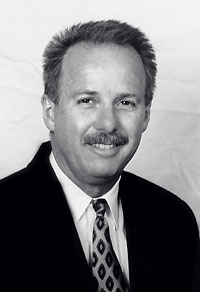|
This is an archived article.
For the latest news, go to the Advance Homepage
For more archives, go to the Advance Archive/Search Page. |
||
|
Our Jobs Are About People's Lives,
"Challenging" is how Chris Dugger defines his new job. As chief operating officer of the Health Center's physicians' practice, University Medical Group (UMG), Dugger says his work is stimulating but demanding, and constantly tests his abilities and resources.
As COO, Dugger is responsible for seeing that the Health Center's clinics work: that patients get access to the appointments and the medical care they need; physicians, nurses and technicians provide appropriate care; and staff and ancillary operations, such as labs, support the clinical functions. UMG is the multi-specialty group practice of the school of medicine. More than 300 physicians and other health care professionals offer a complete range of programs in more than 50 specialties in Farmington and in offices in Simsbury, East Hartford, and West Hartford. "I take my responsibilities very seriously," he says, "because for all of our complex institutions and technology, our jobs are about people's lives and health, and the relationship and trust between the physician and the patient." The challenge is to create a high-performing organization in an environment where reimbursements from insurance and government payers consistently fail to keep pace with increases in the cost of operation. Dugger joined the Health Center in November. He comes from Louisville, KY, where he did similar work, and he brings experience and enthusiasm to the job. "I'm grateful to be chosen to be part of the leadership team for the group," he says. "I have a sense of the personal bonds developed here during challenging times. People weathered the stress, and they faced tough times working together and putting aside differences. That level of teamwork is appealing to me." One of the things that attracted him to the Health Center, he says, was the level of medical services offered. The John Dempsey Hospital, with 204 general acute care beds and 20 nursery beds, is smaller than most academic hospitals, as are the medical and dental schools, with 320 and 160 enrolled, respectively, in the four-year programs. But despite its size relative to some other larger teaching institutions, the Health Center plays an important role in Connecticut and a key role in the Farmington Valley. "Our clinics are able to offer a comprehensive array of primary care services and tertiary services that you usually find only in large urban centers," he says. "One of the challenges common to all academic medical centers comes from the multiple missions. Their physicians must perform research and educate, as well as provide care in a clinical setting. "The continuity of patient care is vital," he says. "My goal is to help the organization offer an ambulatory patient-care experience that's as good or better than that offered by private health care providers." One of his long-term worries is that the health care system is constantly asked to expand and invest in new technologies and systems, despite an almost completely price-regulated system of payment. "I find it amusing to hear commentators discuss their belief that increased competition will lead to lower healthcare costs," he says. "That presumes there are excess 'profits' in the system that providers will voluntarily reduce in the face of a loss of market share. Most prices are fixed by third parties however, and payers have put pressure on the bottom-lines of providers for more than a decade." The fact that there are a significant number of people across the country who don't have access to health care other than the strained public system of emergency departments and safety-net clinics, is a societal problem that will have to be addressed at some point, he says. "For hospitals or physicians to continue to provide care at well below what it costs is an economic factor that is distorting the system in a negative way. We need to figure out how to give the under-insured and the non-insured better access to health care at the primary care level, so we can intervene with a problem before it becomes worthy of hospitalization, which consumes more resources and delivers care in the most expensive setting," he says. At the same time, however, there are many developments that are very exciting for healthcare providers and patients, such as ongoing efforts to improve quality and safety, and better systems to manage information and provide easy access to research and practice standards. He is optimistic about the Health Center's future. "I hope to structure my tasks in a way that develops supportive relationships throughout UMG, John Dempsey Hospital, and the School of Medicine," Dugger says. "I know that great personal satisfaction comes from overcoming challenges as part of a team, and I want to do everything I can do to build on and enrich the terrific culture we already have." |

